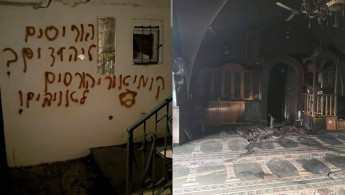Jerusalem mosque burned, vandalised in suspected hate crime by Israeli extremists
The mosque in the Beit Safafa neighbourhood suffered damage in the attack but no one was hurt, Israeli newspaper Haaretz reported.
Firefighters were called to the scene and quickly brought the blaze under control. Police have opened an investigation into the suspected arson attack.
"Police were summoned to a mosque in Beit Safafa, in Jerusalem, following a report of arson in one of the building's rooms and spraying of graffiti on a nearby wall outside the building," a police statement said.
"A wide-scale search is taking place in Jerusalem," police spokesman Micky Rosenfeld told AFP. "We believe that the incident took place overnight. We are searching for suspects."
The spokesman would not say if police viewed it as a hate crime.
The mosque was branded by graffiti referencing the illegal West Bank settlement outpost of "Kumi Ori" - the site of several clashes between settlers and Israeli soldiers.The graffitti on the building read "Destroying Jews? Kumi Ori is destroying enemies!".
Twitter Post
#القدس ويخطون شعارات عنصرية#منبر_فلسطينpic.twitter.com/mNJIvKjNJ9— أخہتہ ٳلہمْڒٍجہله🇩🇿🇵🇸🦋 (@marejala_ps) January 24, 2020
|
Ofer Cassif, a parliamentarian from the Palestinian-majority Joint List, condemned the hate crime, saying in comments quoted by Haaretz, "when the police and the General Security Services deliberately refrain from punishing the rioters, it will come as no surprise if people will also soon be burned".
"There is no doubt that disregarding the state is a high instruction, from Netanyahu himself. The events serve him," Cassif added.
The Times of Israel newspaper said on Friday that the wildcat outpost "is home to seven families along with roughly a dozen extremist Israeli teens".
All settlements on occupied Palestinian land are considered illegal under international law, but Israel distinguishes between those it has approved and those it has not.
| |
The paper said that "a number of young settlers living there were involved in a string of violent attacks on Palestinians and (Israeli) security forces."
Vandalism against Palestinian sites and communities in Israel are becoming increasingly common.Vandals in northern Israel slashed the tyres of some 20 cars and scrawled anti-Palestinian and anti-Muslim slogans on buildings in a majority Palestinian town in December.
These incidents bear the hallmark of a "price tag" attack, a euphemism for Jewish nationalist hate crimes that generally target Palestinian property in revenge for attacks against Israelis.
Palestinians constitute around 20 percent of the population of the State of Israel, mainly descendants who remained on their land in 1948, when Zionist militias forcibly expelled the vast majority of Palestinians from what is now Israel.
They have regularly suffered discrimination in Israel in areas such as housing, healthcare, and education. The 2019 Israeli "nation-state" law stated that only Jewish citizens of Israel have the right to self-determination in Israel.
Follow us on Twitter and Instagram to stay connected





 Follow the Middle East's top stories in English at The New Arab on Google News
Follow the Middle East's top stories in English at The New Arab on Google News
![Netanyahu furiously denounced the ICC [Getty]](/sites/default/files/styles/image_330x185/public/2024-11/GettyImages-2169352575.jpg?h=199d8c1f&itok=-vRiruf5)
![Both Hamas and the Palestinian Authority welcomed the ICC arrest warrants [Getty]](/sites/default/files/styles/image_330x185/public/2024-11/GettyImages-2178351173.jpg?h=199d8c1f&itok=TV858iVg)
